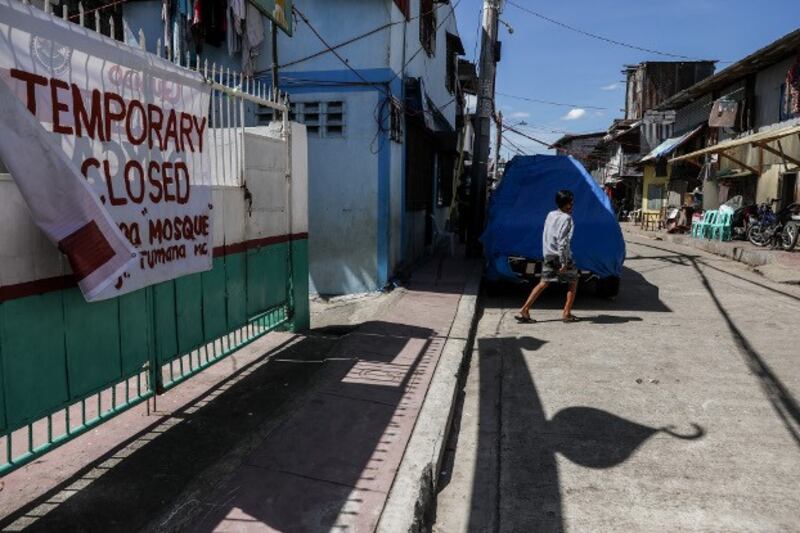For decades even during times of war, Ismal Bantillan responded without fail to the muezzin’s call to prayer. But COVID-19 has changed Ramadan in his small Muslim community in the southern Philippines.
The coronavirus, in some ways, is worse than any conflict because social distancing has become the new normal even during the Muslim holy month of fasting, he said.
Bantillan, 53, a retired government employee who witnessed years of insurgencies in the mineral-rich, but strife-torn southern Mindanao island, longs for the day when he and others can simply be allowed to visit a mosque again.
“My wife, daughter and eldest son instead pray inside our house,” he told BenarNews hours after the holy month began. “I am praying to Allah during this month of Ramadan that everything will be back to normal, so that we can get back to work.”
Sheikh Abu Huraira Udasan, a grand mufti and the head of Darul Ifta, the highest Islamic religious authority in the country, declared Friday as the official start of Ramadan based on the new moon.
More than 13 million Filipino Muslims, mostly in Mindanao, observed their faith on Friday with a fast, one of the five pillars of Islam. During Ramadan, Muslims refrain from eating and drinking from sun up to sun down and aim for restraint in thought, words and deeds.
Unlike in previous years, Ramadan is being celebrated amid worldwide fears of COVID-19, which has overtaken threats of terrorism as the top security concern.
“We are confronted by the coronavirus disease, also known as COVID-19,” said Zia Alonto Adiong, a Muslim leader whose hometown of Marawi was destroyed during an attack by Islamic State-linked militants three years ago. The five-month siege spearheaded by the Abu Sayyaf group killed 1,200 people.
“It is difficult to imagine a place left untouched by this disease and it is easy to believe that we are all vulnerable to this same invisible virus, to this faceless enemy,” Adiong said.
Elsewhere in Marawi, residents who have been displaced for three years said the epidemic has added to their misery.
They said aid had slowed to a trickle and residents could not travel to find food.
Supplies limited
Drieza Lininding, the leader of a group of young professionals, academics and activists called the Moro Consensus Group of Marawi, said the few stores that remained open lacked products to sell. Fish caught in nearby Lanao Lake could not be transported because no one is allowed to travel.
The government imposed restrictions last month after three people suspected of being infected by COVID-19 died. Aside from Marawi, the nearby province of Lanao del Norte and Iligan City have imposed lockdowns.
Beef and fruits – among the favorites during Ramadan – are in short supply because there are no shipments from other provinces.
“We have suffered for three years and now the pandemic is adding more to our suffering,” Lininding told BenarNews.
In Cotabato, Aisah Malang, 18, has been forced to shutter her small store, the only source of income she uses to buy formula for her 1-year-old boy.
“We don’t know what to do, my husband is out of work because his company closed,” Malang said. “And I am pregnant with our second child.”
The nation recorded 211 new COVID-19 cases and 15 new deaths on Friday, bringing the totals to 7,192 and 477, respectively. Globally, more than 2.7 million people have been infected and more than 193,000 have died, according to data compiled by disease experts at U.S.-based Johns Hopkins University.

Former guerrilla responds
Even former guerrillas who fought in the region’s decades of separatist rebellions have no answer for COVID-19’s onslaught. Murad Ebrahim, leader of the former separatist group Moro Islamic Liberation Front (MILF), said this year’s holy month would be different.
“We now wake up to a reality where taking care of each other means maintaining distance from one another,” said Murad, who serves as chief minister of the Bangsamoro Autonomous Region in Muslim Mindanao.
“To my fellow Muslims, know that we are doing our best to ease your pain and suffering in these difficult times,” he said in his Ramadan message.
“May Allah keep ourselves our families and communities safe from the threats of the pandemic,” he said.
